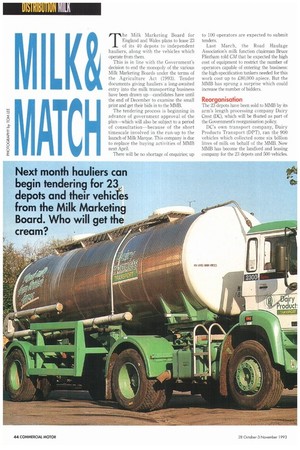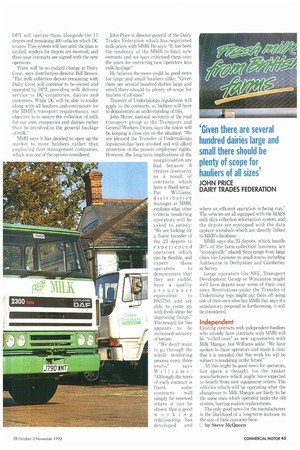Next month hauliers can begin tendering for 23, depots and
Page 46

Page 47

If you've noticed an error in this article please click here to report it so we can fix it.
their vehicres from the Milk Marketing Board. Who will get the cream?
The Milk Marketing Board for England and Wales plans to lease 23
of its 40 depots to independent hauliers, along with the vehicles which operate from them.
This is in line with the Government's decision to end the monopoly of the various Milk Marketing Boards under the terms of the Agriculture Act (1993). Tender documents giving hauliers a long-awaited entry into the milk transporting business have been drawn up—candidates have until the end of December to examine the small print and get their bids in to the MIVfl3.
The tendering process is beginning in advance of government approval of the plan—which will also be subject to a period of consultation—because of the short timescale involved in the run-up to the launch of Milk Marque. This company is due to replace the buying activities of MMB next April.
There will be no shortage of enquiries: up to 100 operators are expected to submit tenders.
Last March, the Road Haulage Association's milk function chairman Bruce Flintham told CM that he expected the high cost of equipment to restrict the number of operators capable of entering the business: the high-specification tankers needed for this work cost up to 480,000 apiece. But the MMB has sprung a surprise which could increase the number of bidders.
Reorganisation
The 23 depots have been sold to MB by its arm's length processing company Dairy Crest (DC), which will be floated as part of the Government's reorganisation policy.
DC's own transport company, Dairy Products Transport (DPT), ran the 900 vehicles which collected some six billion litres of milk on behalf of the MMB. Now MMB has become the landlord and leasing company for the 23 depots and 500 vehicles. DPT will operate them, alongside the 17 depots and remaining 400 vehicles which DC retains. This system will last until the plan is ratified, tenders for depots are received, and three-year contracts are signed with the new operators.
There will be no radical change at Dairy Crest, says distribution director Bill Brown: "The milk collection depots remaining with Dairy Crest will continue to be owned and operated by DPT, providing milk delivery service to DC creameries, dairies and customers. While DC will be able to tender along with all hauliers and contractors for the MMB's transport requirements, our objective is to secure the collection of milk for our own creameries and dairies rather than be involved in the general haulage of milk."
MMB says it has decided to open up the market to more hauliers rather than employing fleet management companies, which was one of the options considered. John Price is director-general of the Dairv Trades Federation which has negotiated milk prices with MMR He says: "It has been the tendency of the MMB to limit new entrants and we have criticised them over the years for restricting new operators into milk haulage."
He believes the move could be good news for large and small hauliers alike: "Given there are several hundred dairies large and small there should be plenty of scope for hauliers of all sizes."
Transfer of Undertakings regulations will apply to the contracts, so bidders will have to demonstrate an understanding of this.
John Moore, national secretary of the road transport group at the Transport and General Workers Union, says the union will be keeping a close eye on the situation: "We are pleased the Transfer of Undertakings legislation has been invoked and will afford protection of the present employees' rights. However, the long-term implications of the reorganisation are bad because it creates insecurity as a result of contracts which have a fixed term."
Pat Williams, distribution manager at MMB, explains what other criteria tendering operators will be asked to satisfy: "We are looking for a fluent transfer of the 23 depots to experienced operators which can be flexible, and expect those operators to demonstrate that they are viable, have a quality assurance equivalent to BS5750, and are able to come up with fresh ideas for improving things." The reward for this appears to be increased security of tenure.
"We don't want to go through the whole tendering process every three years," says Williams: "Although the term of each contract is fixed, some contracts will simply be renewed where it can be shown that a good working relationship has developed and where an efficient operation is being run." The vehicles are all equipped with the MACS milk data collection information system, and the depots are equipped with the data capture terminals which are directly linked to MB's database.
MMB says the 23 depots, which handle 30% of the farm collection business, are "strategically" placed. Sites range from large cities like Leicester to small towns including Ashbourne in Derbyshire and Camberley in Surrey.
Large operators like NFC, Transport Development Group or Wincanton might well have depots near some of their own sites. Restrictions under the Transfer of Undertaking regs might put them off using one of their own sites but Nam that says if a satisfactory proposal is forthcoming, it will be considered.
Independent
Existing contracts with independent hauliers who already have contracts with MMB will be "rolled over" as new agreements with Milk Marque, but Williams adds: "We have spoken to these operators and made it clear that it is intended that this work too will be subject to tendering in the future."
All this might be good news for operators, but spare a thought for the tanker manufacturers which might have expected to benefit from new equipment orders. The vehicles which will be operating after the changeover to Milk Marque are likely to be the same ones which operated under the old system, barring routine replacements.
The only good news for the manufacturers is the likelihood of a long-term increase in the size of their customer base.
E by Steve McQueen
































































































